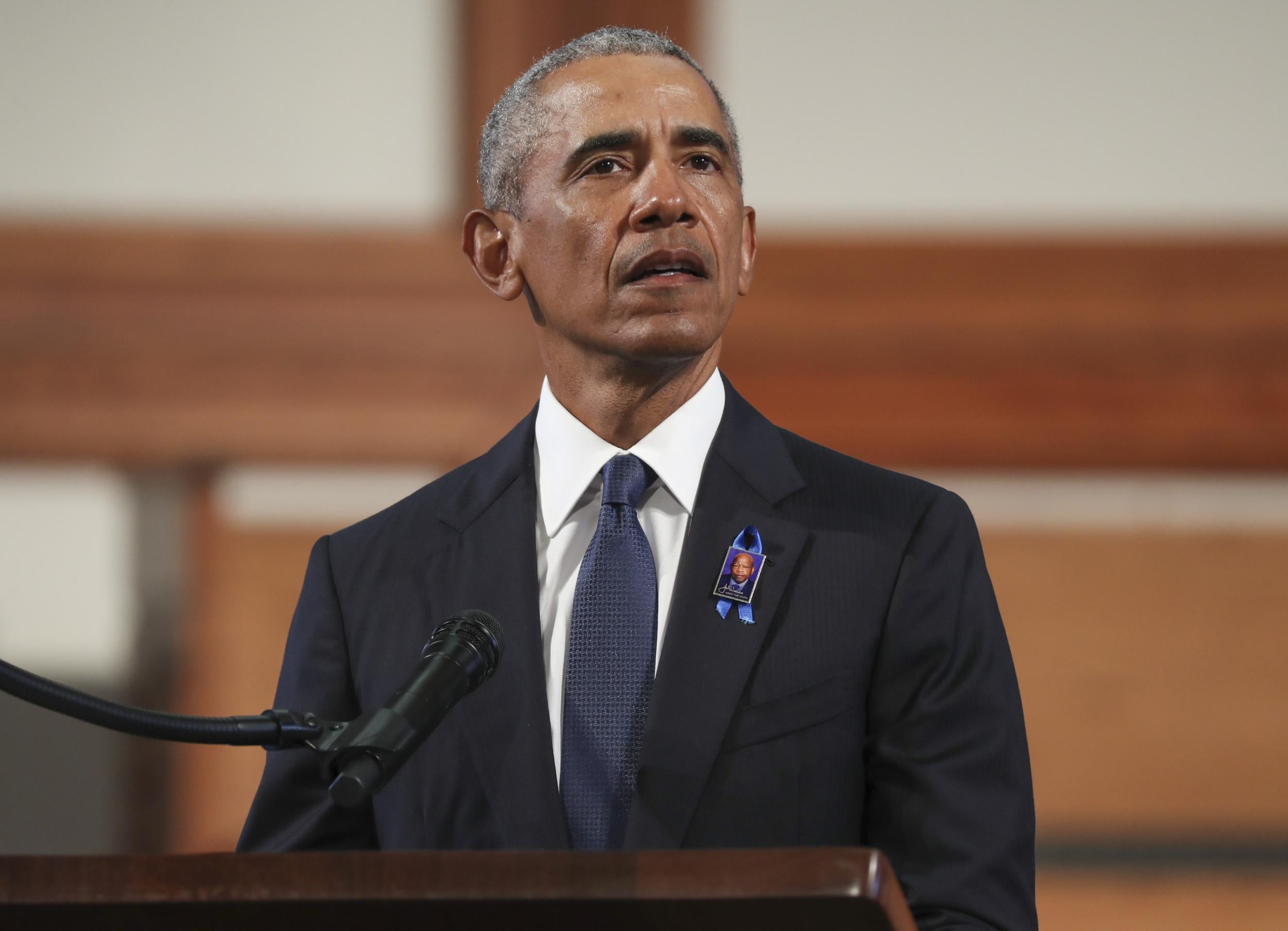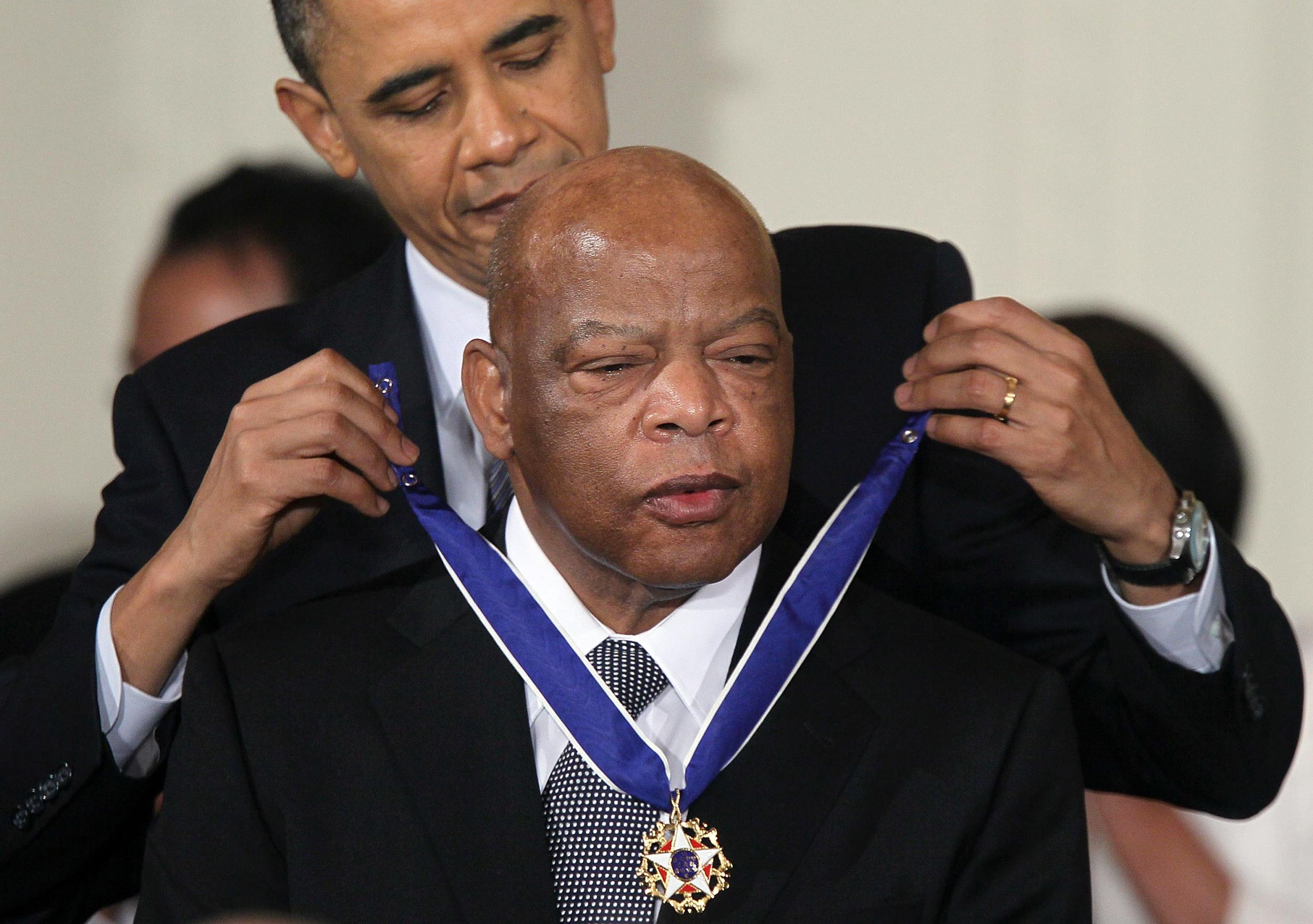Obama is now on a head-on collision course with Trump to save the 2020 US election
Former president spoke partly about past, writes Andrew Buncombe, but also very much about present


Back in February 2008, Congressman John Lewis had some bad news for Hillary Clinton and her presidential campaign.
It was true that just a few months earlier, the civil rights hero had backed her bid to become the nation’s first woman president. But now, painfully and after no small consideration, he was having to take that endorsement back.
The reason? A young, one-term senator from Illinois who had lit up that primary contest with his rhetoric and vision, and whom his constituents in Georgia’s 5th congressional district overwhelmingly supported.
“Something is happening in America,” Lewis said. “There is a movement, there is a spirit, there is an enthusiasm in the hearts and minds of the American people that I have not seen in a long time – since the candidacy of Robert Kennedy.”
Barack Obama thanked the often-bloodied veteran of the struggle for civil rights – who was famously beaten nearly to death on Selma’s Edmund Pettus Bridge – not just that day, but on many occasions for his support.

Among them was a speech in 2015 to mark the 50th anniversary of the Selma March, and the contributions of those who had passed, and those who were still alive – including Amelia Boynton Robinson and Lewis himself.
“Their faith was questioned. Their lives were threatened. Their patriotism challenged,” said Obama.
This week, Obama found cause to again praise the congressman, and in doing so grasp more firmly than ever before the mantle of not just Lewis, but his entire generation who struggled for the most fundamental rights of American citizenship.
Delivering a eulogy at the Atlanta funeral of Lewis, who died aged 80 after contracting pancreatic cancer, Obama said the congressman believed “that in all of us, there exists the capacity for great courage”.
Yet while Obama’s speech was partly concerned with the now sepia-hued struggle of Lewis and colleagues such as Dr Martin Luther King, it was also very much about the present, and the fight – here in the summer of 2020, 55 years after the passage of the Voting Rights Act – to ensure everyone who wants to cast a ballot is able to do so.
That very day, even as the New York Times published an essay Lewis had penned to be published on the day of his funeral, Obama’s successor, Donald Trump, had threatened to delay November’s election, claiming – contrary to all evidence – that postal ballots were vulnerable to fraud.

“It will be a great embarrassment to the USA. Delay the Election until people can properly, securely and safely vote?” Trump had tweeted.
Critics of the president, who is trailing badly in the polls to Obama’s vice president, Joe Biden, denounced his proposal, which would require an act of Congress, as fascistic. Even Republicans condemned the idea, which Trump would later repeat at a White House press briefing.
Obama, 58, is visibly older than the senator who accepted Lewis’s endorsement 12 years ago. Yet, when he spoke at the Ebenezer Baptist Church in Atlanta, he did so with close to as much passion as he has ever displayed.
And on the matter of race, in particular, he appeared able to speak far more freely than he was as president.
“Bull Connor may be gone. But today we witness with our own eyes police officers kneeling on the necks of Black Americans,” he said.
“George Wallace may be gone. But we can witness our federal government sending agents to use tear gas and batons against peaceful demonstrators.”
Obama did not mention Trump by name, but he did not need to.
“We may no longer have to guess the number of jellybeans in a jar in order to cast a ballot. But even as we sit here, there are those in power doing their darnedest to discourage people from voting – by closing polling locations, and targeting minorities and students with restrictive ID laws, and attacking our voting rights with surgical precision, even undermining the postal service in the run-up to an election that is going to be dependent on mailed-in ballots so people don’t get sick.”
For Democrats, the speech, delivered in one of many states controlled by Republican governors that have sought to limit voting rights, was a call to arms.
For the final, 100-odd days of the 2020 presidential campaign, as Trump continues to undermine and the delegitimise the election he fears he will lose, Democrats will be organising – filing lawsuits to open access to mail-in -ballots, trying to ensure there are adequate poll workers, and hoping the postal services have sufficient resources.
Not for more than half-a-century has the nation been so seized with the issue of racial justice. Yet, say critics of Trump, never has the right to vote been so threatened.
In his posthumously published essay, Lewis paid thanks to the American people who had inspired him, saying “millions of people motivated simply by human compassion laid down the burdens of division”.
We now know getting those words into the New York Times, was touch and go. An editor revealed there was a scramble to complete the essay as Lewis’s health worsened and that he was even read the final rites before the last approval for the words was granted.
“When you see something that is not right, you must say something,” Lewis urged in that essay. “You must do something. Democracy is not a state. It is an act, and each generation must do its part to help build what we called the Beloved Community, a nation and world society at peace with itself.”
Join our commenting forum
Join thought-provoking conversations, follow other Independent readers and see their replies
Comments
Bookmark popover
Removed from bookmarks